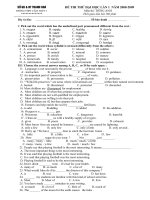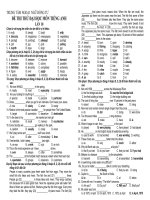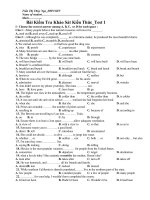Thi Thử ĐH-tiếng anh-2009-Hà Nội-có key
Bạn đang xem bản rút gọn của tài liệu. Xem và tải ngay bản đầy đủ của tài liệu tại đây (122.14 KB, 13 trang )
ĐỀ THI THỬ ĐẠI HỌC ĐỢT II (2008-2009)
Trường: Lương Thế Vinh – Hà Nội
Thời gian: 90 phút
Questions: 1 - 10
Read the following passage and mark the letter A, B, C, D on your answer sheet
to indicate the correct word for each of the blanks.
Interpreting the feelings of other people is not always easy, as we all know, and
we (1) ………….. as much on what they seem to be telling us, as on the actual words
they say. Facial (2) …………… and tone of voice are obvious ways of showing our
(3) .................. to something, and it may well be that we unconsciously express views
that we are trying to hide. The art of being ( 4) ………… lies in picking up these
signals, realizing what the other person is trying to say, and acting so that they are not
embarrassed in any way. For example, we may understand that they are in fact (5)
…………… to answer our question, and so we stop pressing them. Body movements
in general may also indicate feelings, and interviewers often pay particular attention to
the way a candidate for a job walks into the room and sits down. However it is not
difficult to present the right kind of appearance, while what many employers want to
know relates to the candidate’s character traits, and (6) ………….. stability. This raises
the awkward question of whether job candidates should be asked to complete
psychological tests, and the further problem of whether such tests actually produce (7)
…………….. results. For many people, being asked to take part in such a test would
be an objectionable (8) ……………….. into their private lives.
After all, a prospective employer would hardly ask a candidate to run a hundred
meters, or expect his or her family doctor to provide (9) …………… medical
information. Quite apart from this problem, can such tests predict whether a person is
likely to be a (10) ……………… employee or a values colleague?
Question 1: A. reckon B. rely C. trust D. estimate
Question 2: A. manner B. image C. expression D. looks
Question 3: A. notion B. feeling C. view D. reaction
Question 4: A. successful B. humble C. good at D. tactful
Question 5: A. hesitant B. reluctant C. tending D. used
Question 6: A. psychological B. physical C. similar D. relevant
Question 7: A. reliable B. predictable C. faithful D. regular
Question 8: A. invasion B. infringement C. intrusion D. interference
Question 9: A. confidential B. secretive C. reticent D. classified
Question 10: A. laborious B. particular C. thorough D. conscientious
Questions 11 – 15:
Mark the letter A, B, C or D on your answer sheet to show the underlined part
that needs correction.
Question 11: Schools are important, vital means by which modern education is
A B C
provided.
D
Question 12: The philosophers and artists of ancient Greece and Rome emphasized the
A B
study of human as fundamental to their doctrine.
C D
Question 13: Everything we think we have disposal of still here on our planet and in
A B C D
the ecosystem.
Question 14: So extensive the lakes are that they are viewed as the largest bodies of
A B C
fresh water in the world.
D
Question 15: As you may know, these data in the table concerning with pressure and
A B
temperature are going to change, following the next experiment.
C D
Questions 16 – 45
Mark the letter A, B, C or D on your sheet to indicate the correct answer to each
of the following questions:
Question 16: Doctors advise people who are deficient …………. Vitamin C to eat
more fruit and vegetables.
A. in B. of C. from D. for
Question 17: “Many happy returns!” – “ _______________!”
A. You too B. The same to you C. Thanks D. Good luck
Question 18: I suggest we ……….. outside the cinema tomorrow at 8.30.
A. meet B. meeting C. met D. will meet
Question 19: Determining the mineral content of soil samples is an extracting process;
……………, experts must perform detailed tests to analyze soil
specimens.
A. so that B. afterwards C. therefore D. however
Question 20: Some animals are on the …………… of becoming extinct.
A. tip B. verge C. edge D. side
Question 21: “How kind, you really shouldn’t have bothered.” – “______________.”
A. It was nothing, really B. Don’t worry, I didn’t bother
C. Why not? I was happy D. It was a very good thing
Question 22: Down into the cave …………………
A. did the rescue party go B. the rescue party went
C. went the rescue party D. did go the rescue party
Question 23: “I thought that the tour began at 3:00.”
- “Oh, no, you’re ______________. It began at 1:30.”
A. too much late here B. too much here late
C. here too late much D. here much too late
Question 24: This ticket ………… one person to the museum.
A. admits B. permits C. enters D. allows
Question 25: The latest crisis was brought ………… by the mishandling of the
economy.
A. over B. in C. about D. down
Question 26: On leaving prison, Vic decided to turn over a new …………... and to
give up his old life of crime.
A. leaf B. chapter C. book D. page
Question 27: The best way of writing a compos
ition in a foreign language is to try and
write ……………. thinking in your own language.
A. expect B. unless C. apart from D. without
Question 28: The names of some synthetic fabrics, including rayon, are rapidly passing
into the popular speech without public apprehension that they are
registered trade names.
A. realization B. questioning C. notice D. gratitude
Question 29: I agree with most of what you said, but I can’t ……….. your idea of
letting children leave school at 14.
A. catch up with B. keep up with C. go along with D. put up with
Question 30: Many children who get into trouble in their early teens go on to become
………. offenders.
A. consistent B. insistent C. persistent D. resistant
Question 31: His father is a bank manager, …………. Makes him easy to have a good
job.
A. whom B. who C. that D. which
Question 32: …………. drivers usually drive very slowly.
A. Learner B. Student C. Learning D. Practice
Question 33: The bank manager said that he ………. Appreciated that we were having
problems, but there was nothing he could do to help.
A. fully B. greatly C. utterly D. largely
Question 34: When facing problems, it is important to keep a sense of ………..
A. comparison B. relativity C proportion D. introspection
Question 35: “What have you been ______?” – “Oh, nothing much. The usual things.”
A. about B. up to C. out with D. down to
Question 36: When he realized the police had spotted him, the man ………… the exit
as quickly as possible.
A. made up B. made for C. made off D. made out
Question 37: The professor noticed that the student’s essay ………… a strong
resemblance to an article he had seen published in a journal.
A. held B. contained C. carried D. bore
Question 38: Ralph Nader was the most prominent leader of the U.S consumer
protection movement.
A. aggressive B. significant C. discriminating D. promiscuous
Question 39: The choir stood in four rows according to their ……… heights.
A. respective B. respected C. respectful D. respectable
Question 40: Being quick on the ………., the student made rapid progress.
A. takeover B. intake C. take-off D. uptake
Question 41: “David seemed very angry.” – “______________.”
A. He seemed B. He had C. He was D. He did
Question 42: ………… further rioting to occur, the government would be forced to use
its emergency powers.
A. Had B. Were C. Should D. Did
Question 43: UNICEF has assumed the responsibility of aiding children in need.
A. evaded B. affected C. violated D. taken on
Question 44: He manages to get ……….. his monthly salary in a couple of weeks.
A. through B. by C. round D. over
Question 45: My husband doesn’t treat me with as much consideration as he used to; I
rather feel that he takes it for ………..
A. supplied B. granted C. given D. accepted
Questions 46 – 50:
Mark the letter A, B, C or D on your sheet to indicate the correct and natural way
of combining of each pair of sentences given:
Question 46: We’d better leave them a note. It’s possible they’ll arrive later.
A. If they arrive late, we’d better leave them a note.
B. We’d better leave them a note as they possibly arrive later.
C. They’ll probably arrive later so that we’d better leave them a note.
D. We’d better leave them a note in case they arrive later.
Question 47: Women still cover their heads in some countries. They did so in the past.
A. In the past, women cover their heads but they do so today in some
countries.
B. Women still cover their heads in some countries as they did in th past.
C. Women still cover their heads in some countries similar to what they
did so in the past.
D. Women still cover their heads in some countries as they did so in the
past.
Question 48: Father has been working all day. He must be tired now.
A. Father must work all day and tired now.
B. Father thinks he is tired now because he has been working all day.
C. I’m sure that father is tired after working all day.
D. I think father was tired all day working.
Question 49: Her husband died. When she heard the news, she fainted.
A. On hearing the news of her dead husband, she fainted.
B. When hearing the news from her dead husband, she fainted.
C. On hearing the news of her husband’s death, she fainted.









